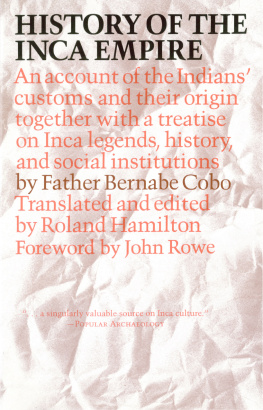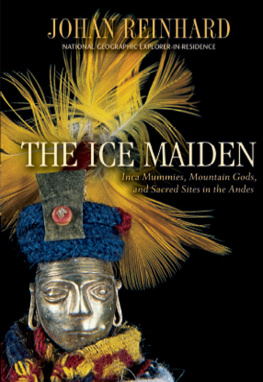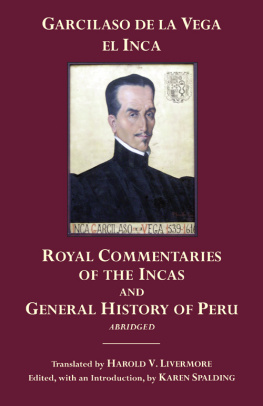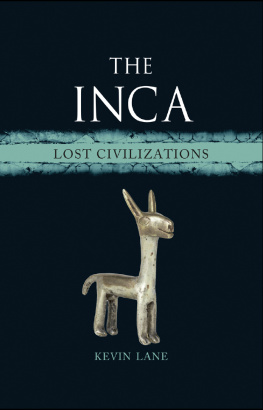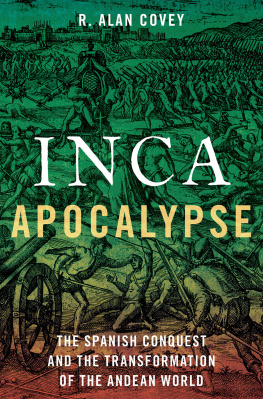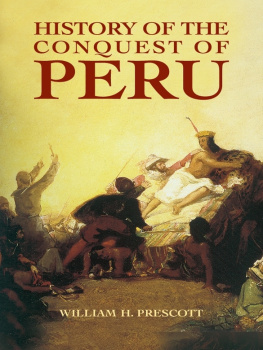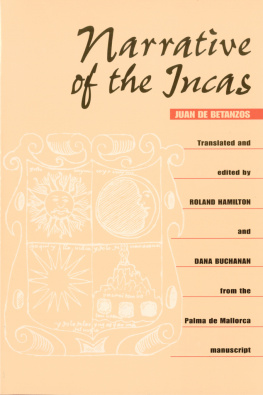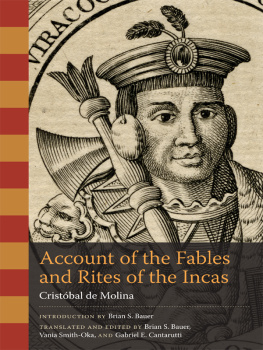HISTORY OF THE INCA EMPIRE
The Texas Pan American Series
History of the Inca Empire
An account of the Indians customs and their origin together with a treatise on Inca legends, history, and social institutions by Father Bernabe Cobo
Translated and edited by Roland Hamilton from the holograph manuscript in the Biblioteca Capitular y Colombina de Sevilla Foreword by John Howland Rowe

UNIVERSITY OF TEXAS PRESS,
AUSTIN
Library of Congress Cataloging in Publication Data
Cobo, Bernab, 15821657.
History of the Inca Empire.
Selections translated from Historia del Nuevo Mundo.
Bibliography: p.
1. Incas. 2. Indians of South AmericaPeru. I. Hamilton, Roland, 1936 II. Title
F3429.C5813 985 79-12672
ISBN 0-292-73025-X
ISBN 978-0-292-74919-1 (e-book)
ISBN 978-0-292-78980-7 (individual e-book)
Copyright 1979 by the University of Texas Press
All rights reserved
Printed in the United States of America
Eighth paperback printing, 2005
Requests for permission to reproduce material from this work should be sent to:
Permissions
University of Texas Press
Box 7819 Austin, Texas 78713-7819
Foreword
Roland Hamilton has provided us with the first English translation of any substantial part of one of the classic Spanish sources on Inca history and institutions, the Historia del Nuevo Mundo (History of the New World) by the Jesuit scholar Bernab Cobo. Cobo was an Andalusian by birth, but he spent most of his adult life in the New World. His interest in the Incas was probably aroused by his experiences as a student of theology in Cuzco from 1609 to 1613, but his book about them was not finished until 1653, when Cobo was seventy-three years old.
In using Cobos work, it should be remembered that we are dealing with a work of seventeenth-century scholarship. Relatively little of the part about the Incas is based on first-hand observation or interviewing living informants. For the most part, Cobo relied on earlier written sources, many of them in manuscript, which he simply paraphrased and combined. His paraphrasing usually involved some condensation and sometimes interpretation of the original, and he had to make difficult choices when he found contradictions in the sources available to him. His object was to weave the materials he had into a coherent narrative.
Not many seventeenth-century writers acknowledged their sources for particular information. Those most likely to do so were theologians and jurists who felt the need to support their statements by citing authority. In this tradition, Cobo gave specific references when he was debating a problem with theological implications, such as the peopling of the New World or the identification of the New World with the Ophir mentioned in the Old Testament. When he came to the subject of the Incas, he gave a generalized account of his sources, identifying only a few of the principal ones specifically. We can identify some but not all of the sources he did not mention. A printed one which falls in this category is the Symbolo catholico indiano of Luis Jernimo de Or (Lima, 1598) from which Cobo took some incidents in his account of the deeds of Mayta Capac; he also had at least one manuscript source on Inca history, probably a lost work by Cristbal de Molina written before 1575. Much of his information on Inca laws was derived from sixteenth-century testimony by Garca de Melo; another of his sources on Inca institutions was a report by Francisco Falcn, probably the one Falcn presented to the Second Provincial Council of Lima in 1567. None of these sources was acknowledged, though Cobo did name another work by Cristbal de Molina which he used in his chapter on Inca origin legends (Book II, and elsewhere in chapters on Inca mythology and religion not yet translated.
The complete work of which these two books are a part was clearly inspired by the Historia natural y moral de las Indias (Natural and Moral History of the Indies), written by the earlier Jesuit scholar Jos de Acosta and published in Seville in 1590. Cobo refers to Acosta occasionally, although not as often as his intellectual debt to his predecessor would lead a modern reader to expect. Cobos handling of the problem of the peopling of the New World, for example, is based directly on Acostas. The chief difference is that Cobo devoted special attention to the argument, which he did not accept, that the Ophir of the Bible was Peru or some other part of America. Cobos preoccupation with the Ophir theory, which Acosta had refused to take seriously, may have been motivated by something he had read (see the translators to Book II).
In Cobos time, the most detailed published account of Inca history was the Commentarios reales... de los Yncas (Royal Commentaries of the Incas) of Garcilaso de la Vega, which had appeared in Lisbon in 1609. Cobo referred to this work in discussing his sources, and he evidently used it. Since Garcilasos mother was an Inca princess, and he claimed that he had gotten his version of Inca history from members of her family, his account had the appearance of considerable authority. Garcilasos version of Inca history is in fact largely fictitious; most of it seems to be a pious fraud perpetrated by Garcilaso himself, rather than a narrative concocted by his mothers relatives. Cobo might have been able to detect the fraud if he had asked his Inca friends in Cuzco for their family traditions, but there is no indication that he did more than record the traditional list of Inca rulers during his stay in Cuzco. The chief point that appears to have concerned him in Cuzco was the number of Inca rulers, the length of the dynasty. Garcilasos account was not very deviant in this respect; he added only one ruler to the traditional list, and Cobo did not accept the addition.
The chief matter on which Cobo accepted Garcilasos version against other evidence was the timing of the Chanca attack on Cuzco and the crucial victory which saved the Inca state. Garcilaso quoted the accounts of the Inca victory over the Chancas given by Jernimo Romn y Zamora and Jos de Acosta, both of whom attributed the victory to Pachacuti, but Garcilaso said that both authors were confused on this point, and that the victory was won by Viracocha, one reign earlier. Cobo evidently allowed himself to be convinced by Garcilaso and adjusted his narrative accordingly. The decision is understandable in the light of Garcilasos apparent authority, but from our perspective it was a mistake. The sources not available to Cobo which have come to light in more recent times indicate clearly that Romn y Zamora and Acosta were right in this case, and Garcilaso was wrong. The section of Cobos narrative affected by the influence of Garcilaso is that between the reigns of Inca Roca and Topa Inca. Cobos material on later Inca history is not based on Garcilaso and preserves valuable testimony from better sources.
The section of Cobos work dealing with Inca institutions is chiefly based on one or more reports by Juan Polo de Ondegardo, though Cobo also used other sources which he did not cite, as was noted earlier. Polo de Ondegardo was an investigator active in the mid-sixteenth century who is generally trusted by modern scholars. He certainly had good opportunities to inform himself. Two major reports of Polos were known to William H. Prescott, the pioneer American historian of the conquest of Peru, and both have subsequently been published. Polo wrote in a somewhat convoluted and legalistic style, with much repetition, and his original reports are consequently not easy reading. Where Cobo summarized Polo, Cobos presentation is clearer, so that the meaning, as Cobo understood it, is more accessible.
What makes Cobos work important for modern readers is that it provides a synthesis of Inca history and culture which is based in large part on sixteenth-century manuscripts, many of which have been lost since he wrote. The two books translated here, plus the two which follow them in the original work, constitute the most comprehensive treatise on the Incas written before the present century.
Next page
